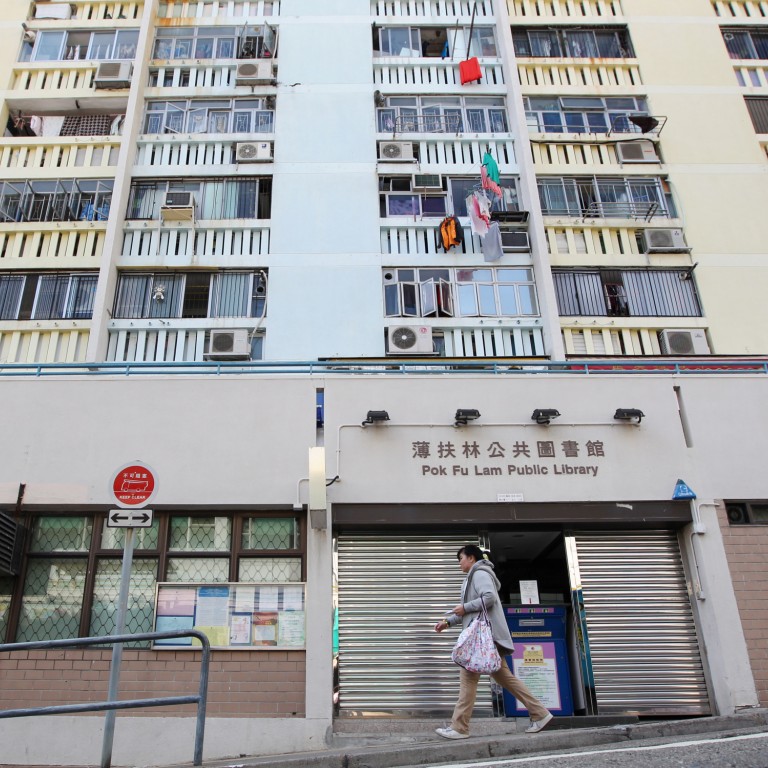
Sell public housing to help defuse Hong Kong protests
Selling public flats can help defuse students protests and tackle the underlying political problem
The youth protest movement that started on September 26 is demanding greater political freedom, but there is also an obvious socioeconomic cause behind this action: the divergence in fortunes between the city's rich and the general public.

Property prices are at a record high, up by a third from the peak in 1997.
The percentage of households owning private homes has increased a mere 0.6 per cent since 1991 to 35.9 per cent, while the down payment on a 400 square foot flat has jumped 15 times to the equivalent of 81 months of median household income.
Society has inevitably become divided and the middle class no longer feels secure about its economic future.
People also see that most of the things they spend their earnings on - housing, public utilities, groceries, transport and the like - appear to be supplied by a dozen or so corporations, many related to property development.
Young people have readily embraced the radical view that tycoons dominate the economy and property developers are hegemonic. They trace these injustices ultimately to Hong Kong's political arrangements, with Beijing as the master behind the curtains.
But this is not the primary reason why society is divided into haves and have-nots.
True, the political arrangements have failed miserably to tackle society's growing divisions. But there are other factors behind the high property prices.
First, economic globalisation between 1980 and 2008 created rapid economic growth and accumulation of wealth worldwide. Property in Hong Kong was highly valued because the city is a prime international economic and financial centre.
Second, since land in prime locations is scarce, redevelopment became a main means of supplying new properties. This process has been hampered by regulatory uncertainties and delays, which helped push up property prices.
Third, Beijing's opening and economic reforms, while part of the process of economic globalisation, have been an independent factor because of their enormity, rapidity and proximity to Hong Kong. They have led to structural economic transformation and rising prosperity in Hong Kong, which has escalated prices.
Young people have the view that tycoons dominate the economy
Fourth, the linked exchange rate regime tied the Hong Kong dollar to the US dollar. Low US interest rates during most of the past three decades fuelled property increases because international capital flowed into the city.
All these factors took place well before 1997, so the post-1997 political arrangements cannot be the cause of high property prices. The radical narrative is fundamentally wrong. The tycoon-dominated economy is also a product of the same circumstances that have helped the wealthy acquire more lines of businesses.
Nevertheless, a young person today faces a huge uphill battle to save enough for the down payment on a home without the support of a well-off parent.
Home ownership can help finance children's education, a small business and retirement, and it is closely connected with upward social mobility. Without more home ownership, Hong Kong will be increasingly saddled with problems of rising intergenerational inequality.
Unfortunately, today's very high property prices will not go away. It is impossible to bridge the divide between those who complain about high prices and those who do not want property prices to fall without hurting the economy. Instead, the correct approach is to turn the have-nots into haves.
Increasing supply alone will not be fast enough. There is a better way to deliver a bigger impact in one strike and at almost no cost to society: sell the stock of public housing to sitting tenants.
The prices must be well below market levels and tenants must be allowed to transfer the unit on the free market and keep any capital gains from the sale.
This aim can be achieved by reviving a modified Tenants Purchase Scheme, lowering the unpaid land premiums for Home Ownership Scheme units and combining the public rental housing and Home Ownership Scheme into a single programme with options to rent, buy or rent now, buy later.
Hong Kong is a capitalist society, but when capital is so unequally distributed, it becomes a political problem.
The voices on the streets come from a generation that has grown up amid the rising gap in the ownership of capital. Only a bold housing policy can help us break out of our political rut. This requires the courage and mandate of a popularly elected chief executive.
If the housing problem is not resolved, every generation in future will believe our political arrangements are at fault.

